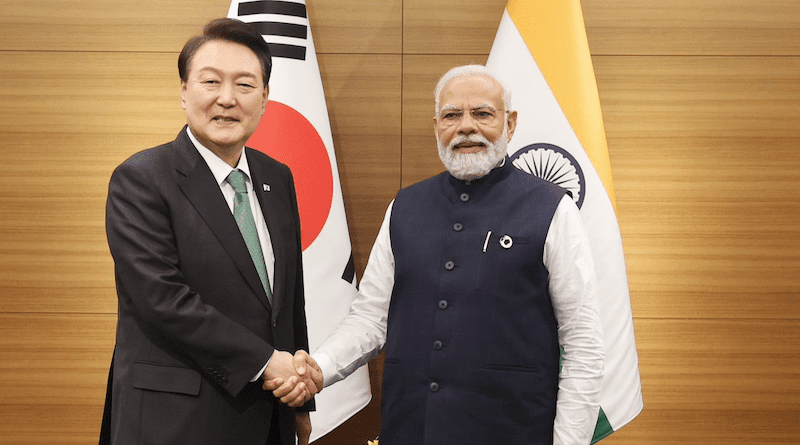A Review Of India-South Korea Diplomatic Relations On Their 50th Anniversary – Analysis
By IPCS
By Dr. Sandip Kumar Mishra
India and South Korea established diplomatic relations in 1973, and are celebrating the 50th anniversary this year. It took a long time for official relations to be established as India wanted to do so simultaneously, with South and North Korea, which the Koreas were not ready for until 1973.
Despite officially announcing the relationship, however, India and South Korea didn’t have too many linkages through the Cold War because of structural reasons. For example, India was a non-aligned country, whereas South Korea was a US security ally. Furthermore, India was a socialist economy, and not receptive to foreign capital and investment, whereas South Korea was an export-led economy.
Changing political and economic dynamics in the post-Cold War era have, however, brought both countries closer to each other. In the past three decades, India-South Korea relations have progressed substantially. They have increased bilateral exchanges in the political, security, strategic, cultural, and people-to-people domains. New Delhi and Seoul, who had less than US$ 1 billion bilateral trade in 1990, saw trade amounting to US$ 27.8 billion in 2022. India and South Korea signed the Comprehensive Economic Partnership Agreement (CEPA) in 2009, and the Strategic Partnership Agreement in 2010. In 2015, with Indian Prime Minister Narendra Modi’s visit to Korea, relations were further enhanced to a Special Strategic Partnership (SSPA).
With reports of North Korea and Pakistan exchanging nuclear and missile technologies emerging in the mid-1990s, India and South Korea considered greater bilateral cooperation in the security domain. Apart from the CEPA and SSPA, the two countries signed an MoU on Defence Cooperation and Defence Research and Development in 2010. They reached a Civil Nuclear Energy Cooperation Agreement in 2011, and an Agreement on the Protection of Classified Military Information in 2014. India’s Act East Policy and South Korea’s New Southern Policy further propelled their bilateral outreach.
On the 50th anniversary of their diplomatic relations, however, one could also say that New Delhi and Seoul haven’t yet realised the full potential of their relationship. For example, the CEPA is said to be limited in scope, and that it hasn’t provided any substantial boost to bilateral relations. After the first two years of CEPA, trade between the two countries was stagnant till 2020. India and South Korea declared in 2015 that CEPA would be revised, but this still hasn’t been concluded. There are speculations that the two countries aren’t satisfied with each other’s proposals, and the process is thus taking more time than expected. India is also looking for more investment from Korea, whereas the latter retains its memory of the unfulfilled POSCO investment intended for India. In the strategic domain, the SPPA is said to be lacking a proper agenda. India and South Korea are also reluctant to take positions or express solidarity on several issues that are strategically important to each other.
On the occasion of this 50th anniversary, New Delhi and Seoul must realise that they have much more potential for a comprehensive relationship. Since their core competencies in the economic domain are different, they could decide on a long-term, win-win framework of cooperation. In the strategic domain, also, they share common concerns regarding the rise of an ‘assertive’ China, and have adopted Indo-Pacific strategies. It is important to note that there are more commonalities between India and South Korea’s Indo-Pacific strategies than those of most other countries. This is because China neighbours both countries, and Beijing also has complex relations with both. For the same reason, New Delhi and Seoul’s Indo-Pacific strategies are more careful and nuanced in their approach towards Beijing. With South Korea-Japan relations improving, India has more opportunity for simultaneous cooperation with both. Now, India and South Korea thus have the same friends, and the same foes or concerns.
To be able to act on this commonality of interests and values in the coming years, India and South Korea must improve their awareness of each other. For this, people-to-people linkages must be encouraged along with cultural and educational exchanges. This can facilitate the realisation of an already existing common aspiration. New Delhi and Seoul should also work to improve the trust quotient between them, which could lead a better look at a long-term comprehensive partnership, rather than short-term mechanical reciprocity. The two countries must celebrate 50 years of diplomatic relations by inculcating mutual awareness and trust, and charting out a comprehensive partnership on both bilateral and regional issues. India and South Korea are middle powers and growing economies that need regional stability, and for this, they must work together.
Dr. Sandip Kumar Mishra is Associate Professor, Centre for East Asian Studies, SIS, JNU, & Distinguished Fellow, IPCS.

